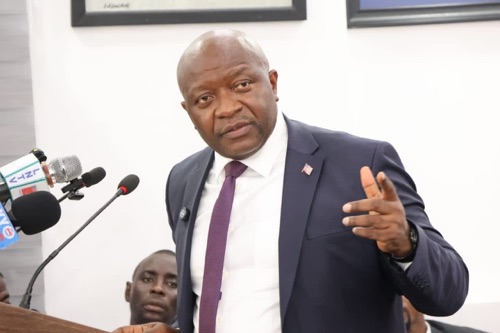At a well-attended Ministry of Information, Cultural Affairs, and Tourism (MICAT) press briefing in Monrovia on Monday, Liberia’s Minister of Finance and Development Planning, Augustine Kpehe Ngafuan, presented key highlights of the Draft FY2026 National Budget, emphasizing economic resilience, fiscal discipline, and investment in transformative infrastructure and social programs.
The proposed US$1.211 billion budget, recently submitted to the National Legislature on behalf of President Joseph Nyuma Boakai, represents a significant increase from the previous fiscal year. According to Minister Ngafuan, domestic revenue accounts for 94 percent (US$1.139 billion) of the total, while external resources contribute US$72 million (6 percent).
“This is significant because domestic revenue has reached 94 percent of our projection,” Minister Ngafuan said. “It demonstrates our growing capacity to finance our own development.”
Revenue and Investment Priorities
The Minister disclosed that tax revenue is projected at US$797 million, while non-tax revenue will reach US$525 million, including a US$200 million signature bonus expected from the pending ratification of the TotalEnergies extension agreement by the Legislature.
He announced that domestic revenue estimates have risen by 47 percent —an increase of US$333 million over FY2025—reflecting improved fiscal management and stronger compliance.
A key feature of the FY2026 budget is the substantial expansion of the Public Sector Investment Program (PSIP), which rises from US$107 million in FY2025 to US$221 million. Of that amount, US$200 million will come from the anticipated TotalEnergies bonus and will be channeled entirely toward transformative infrastructure projects.
Hon. Ngafuan revealed that US$100 million of the PSIP allocation targets Liberia’s top growth constraints—energy and roads —with US$50 million each dedicated to the Liberia Electricity Corporation (LEC) and nationwide road construction.
“We are prioritizing power and roads—two sectors that directly unlock growth,” the Minister emphasized. “Energy expansion, smart metering, and rural electrification are central to this effort.”
Social and Institutional Spending
The FY2026 draft budget also makes key allocations to the education, health, and justice sectors. Funding for educational institutions—including the University of Liberia—will be increased, while the Judiciary receives support for infrastructure and digital transformation of court records.
In a major social intervention, Hon. Ngafuan announced that the government will begin paying the salaries of health workers at ELWA Hospital beginning next year.
“ELWA Hospital is private, but its service is public,” he noted. “We cannot sit and allow such a critical institution to collapse. The government will bankroll salaries to keep it afloat.”
The new Redemption Hospital is expected to be dedicated early next year, and its staffing costs are already included in the proposed budget.
Additionally, the government plans to hire over 200 engineers at the Ministry of Public Works and provide salary top-ups for specialized technical staff across revenue-generating and transparency institutions, including the Liberia Revenue Authority (LRA), Liberia Anti-Corruption Commission (LACC), and General Services Agency (GSA).
Debt Service and Fiscal Responsibility
Ngafuan disclosed that Liberia’s total public debt stock stands at US$2.7 billion, with the FY2026 budget allocating US$200 million for debt servicing—up from US$150 million in the previous year.
He underscored that debt accumulation is not inherently negative if tied to productive investments.
“Debt is not a demon,” he remarked. “What matters is how you use it. Every new loan must yield social and economic returns to expand GDP and reduce the debt-to-GDP ratio.”
The Minister reflected on the challenges of the past fiscal year, citing the withdrawal of USAID from several projects valued at US$300 million, but expressed pride that Liberia weathered the storm.
“Last year was tough, but it ended well,” Hon. Ngafuan stated. “For the first time, domestic revenue surpassed US$700 million. There were no shortfalls last year, and there will be none this year.”
He praised President Boakai’s steady leadership, describing him as an “experienced captain navigating through turbulence.”
Transparency and Public Engagement
In a show of commitment to open governance, Ngafuan confirmed that the full budget document has been published on the Ministry’s website for public scrutiny.
“We welcome analysis from citizens. Transparency is key, and our rating will continue to improve,” he said.
Minister Ngafuan closed his asserted with optimism, assuring Liberians that FY2026 will bring new opportunities for business, jobs, and national transformation.
“Too many good things are happening,” he concluded. “This budget will deliver results. With the support of President Boakai and our people, next year will be better.”
The Draft FY2026 National Budget now awaits deliberation and approval by the National Legislature, marking the next step in Liberia’s budgetary process.



